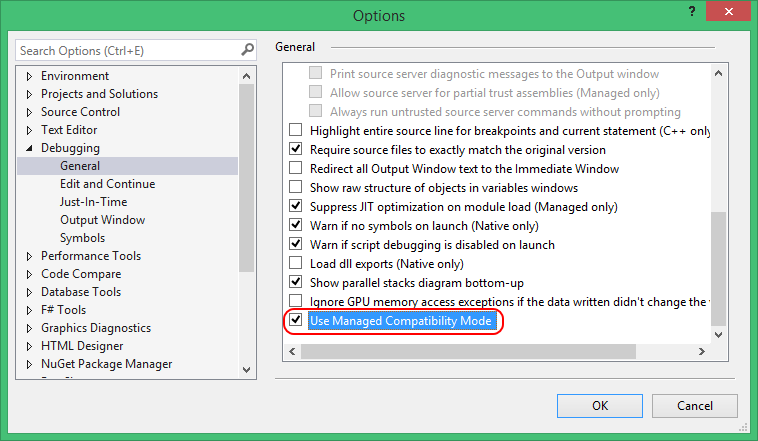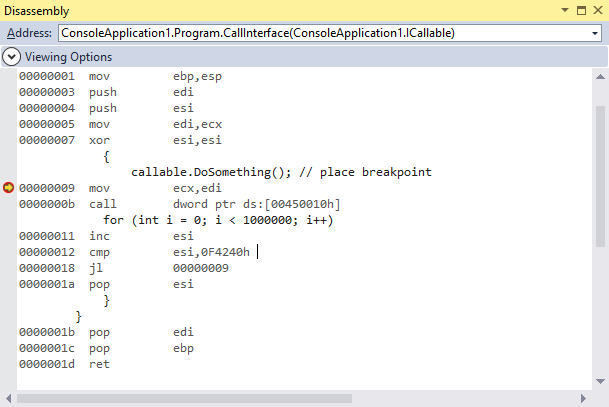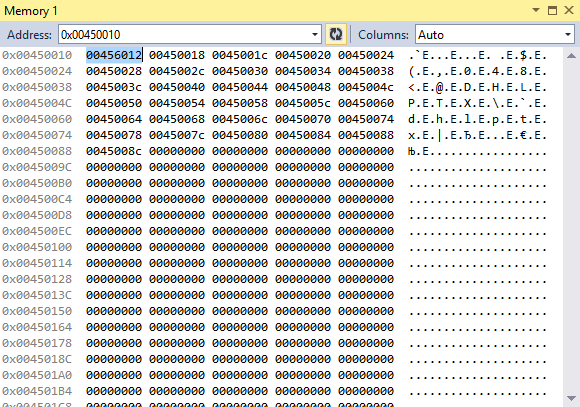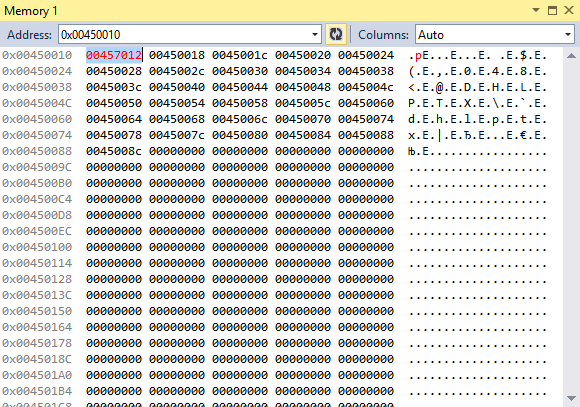In my previous publication, we have started analyzing JIT compilation. Today we are going to explore method dispatch of interfaces and generics (both for classes and separate methods along with real signatures), as well as how to debug release-mode assemblies with optimization. In addition, we’ll figure out the true purpose of System.__Canon.
Environment configuration
At first, we need to set up Visual Studio for debugging release-mode assemblies.
We are going to use VS 2013. Thus, I recommend doing the following:
- enable a compatibility mode to use SOS.dll.
Tools -> Options -> Debugging -> General

- uncheck Suppress JIT optimization on module load and Enable Just My Code.
- Suppress JIT optimization on module load and Enable Just My Code
- Enable Native Debugging
Project Settings -> Debug -> Enable native code debugging
Now, we can move on to our analysis.
Interface dispatch stubs (Virtual Stub Dispatch)
CLR is constantly monitoring the whole code, especially interfaces. In addition, it has several strategies for updating method’s native code.
This feature appeared in CLR 2.0 in 2006. Since then it remained the same in many ways with new heuristics addition.
Consider the following example:
class Program
{
static void Main(string[] args)
{
ICallable target = new FirstCallableImpl();
CallInterface(target);
ICallable target2 = new SecondCallableImpl();
CallInterface(target2);
}
[MethodImpl(MethodImplOptions.NoInlining)]
private static void CallInterface(ICallable callable)
{
for (int i = 0; i < 1000000; i++)
{
callable.DoSomething(); // place breakpoint
}
}
}
interface ICallable
{
void DoSomething();
}
class FirstCallableImpl : ICallable
{
public void DoSomething()
{
}
}
class SecondCallableImpl : ICallable
{
public void DoSomething()
{
}
}
Run Debug. Then, open the Disassembly window (Debug -> Windows -> Disassembly).

Take a look at the call call dword ptr ds:[00450010h] instruction.
To find out a value by the 0x00450010 address, open the Memory window (Debug -> Windows-> Memory-> Memory1).

At this stage, JIT has not created a required call node yet. Thus, the environment interprets a call of the interface method. It means that we can see a linear search of the required method at the runtime.
However, let’s run this code twice. After that, we will see that the value of the 0x0450010 address has been changed:

To check the 00457012 value, load SOS.dll:
Immediate window -> .load sos
!u 00457012
Unmanaged code
00457012 813908314400 cmp dword ptr [ecx],443108h
00457018 0F85F32F0000 jne 0045A011
0045701E E9BD901D00 jmp 006300E0
The jmp 006300E0 instruction is a call to the required interface method. You can check it using this code:
!u 006300E0
Normal JIT generated code
ConsoleApplication1.FirstCallableImpl.DoSomething()
Begin 006300e0, size 1
>>> 006300E0 C3 ret
Well… Let’s figure out what the cmp dword ptr [ecx],443108h instruction compares.
!DumpMT 443108
EEClass: 00441378
Module: 00442c5c
Name: ConsoleApplication1.FirstCallableImpl
mdToken: 02000004 (C:\*path to project*\InterfaceStubsTest.exe)
BaseSize: 0xc
ComponentSize: 0x0
Number of IFaces in IFaceMap: 1
Slots in VTable: 6
Compare this to the FirstCallableImpl type (i.e. MethodTable). If it is true, call the FirstCallableImpl.DoSomething() method.
The jne 0045A011 instruction is fallback to a linear search (as it has been before caching).
When it comes to calling the next type – SecondCallableImpl, it will still be checked in the call-site exactly FirstCallableImpl, rather than SecondCallableImpl.
Still, it is not effective! Thus, after several iterations of code invocations, the environment will exchange the node with cache for a linear search.
Thus, caching is quite effective when we call methods of collections, for example.
Generic types stubs
The release of CLR 2.0 along with generics led to important changes in the runtime environment. Before we needed only the EEClass structure to describe a particular type. Now, we need binding EEClass+MethodTable.
Moreover, List and List will have different EEClass.
Consider an example:
class Program
{
static void Main(string[] args)
{
var refTypeHolder = new HolderOf<object>(null);
var intTypeHolder = new HolderOf<int>(0);
// call JIT
refTypeHolder.GetPointer();
intTypeHolder.GetPointer();
Console.Read(); // place breakpoint
}
}
class HolderOf<T>
{
private readonly T _pointer;
public HolderOf(T pointer)
{
_pointer = pointer;
}
public T GetPointer()
{
return _pointer;
}
}
To check it, we will use the !dumpheap command:
.load sos.dll
!dumpheap -type HolderOf
PDB symbol for mscorwks.dll not loaded
Address MT Size
02d332c8 00f531e0 12
02d332d4 00f53268 12
total 2 objects
Statistics:
MT Count TotalSize Class Name
00f53268 1 12 ConsoleApplication1.HolderOf``1[[System.Int32, mscorlib]]
00f531e0 1 12 ConsoleApplication1.HolderOf``1[[System.Object, mscorlib]]
Total 2 objects
As you can see, the environment has created two different specializations of the HolderOf<T> class:
!dumpmt -md 00f53268 (HolderOf<int>)
!dumpmt -md 00f53268
EEClass: 00f514cc
Module: 00f52c5c
Name: ConsoleApplication1.HolderOf``1[[System.Int32, mscorlib]]
mdToken: 02000006 (C:\*path to samples*\InterfaceStubsTest.exe)
BaseSize: 0xc
ComponentSize: 0x0
Number of IFaces in IFaceMap: 0
Slots in VTable: 6
--------------------------------------
MethodDesc Table
Entry MethodDesc JIT Name
66ae6a30 66964968 PreJIT System.Object.ToString()
66ae6a50 66964970 PreJIT System.Object.Equals(System.Object)
66ae6ac0 669649a0 PreJIT System.Object.GetHashCode()
66b57940 669649c4 PreJIT System.Object.Finalize()
00f5c088 00f53250 JIT ConsoleApplication1.HolderOf``1[[System.Int32, mscorlib]]..ctor(Int32)
00f5c090 00f5325c NONE ConsoleApplication1.HolderOf``1[[System.Int32, mscorlib]].GetPointer()
!dumpmt -md 00f531e0 (HolderOf<object>)
!dumpmt -md 00f531e0
EEClass: 00f51438
Module: 00f52c5c
Name: ConsoleApplication1.HolderOf``1[[System.Object, mscorlib]]
mdToken: 02000006 (C:\*path to samples*\InterfaceStubsTest.exe)
BaseSize: 0xc
ComponentSize: 0x0
Number of IFaces in IFaceMap: 0
Slots in VTable: 6
--------------------------------------
MethodDesc Table
Entry MethodDesc JIT Name
66ae6a30 66964968 PreJIT System.Object.ToString()
66ae6a50 66964970 PreJIT System.Object.Equals(System.Object)
66ae6ac0 669649a0 PreJIT System.Object.GetHashCode()
66b57940 669649c4 PreJIT System.Object.Finalize()
00f5c068 00f53154 JIT ConsoleApplication1.HolderOf``1[[System.__Canon, mscorlib]]..ctor(System.__Canon)
00f5c070 00f53160 NONE ConsoleApplication1.HolderOf``1[[System.__Canon, mscorlib]].GetPointer()
In the above-mentioned dump, we are interested in HolderOf<T>.GetPointer(). Consider:
!dumpmd 00f5325c (HolderOf<int>.GetPointer())
!dumpmd 00f5325c
Method Name: ConsoleApplication1.HolderOf``1[[System.Int32, mscorlib]].GetPointer()
Class: 00f514cc
MethodTable: 00f53268
mdToken: 0600000b
Module: 00f52c5c
IsJitted: yes
CodeAddr: 01090318
!dumpmd 00f53160 (HolderOf<object>.GetPointer())
!dumpmd 00f53160
Method Name: ConsoleApplication1.HolderOf``1[[System.__Canon, mscorlib]].GetPointer()
Class: 00f51438
MethodTable: 00f53178
mdToken: 0600000b
Module: 00f52c5c
IsJitted: yes
CodeAddr: 010902b8
Please notice that there is no System.Object for Holderof. Instead, we have System.__Canon
[Serializable()]
[ClassInterface(ClassInterfaceType.AutoDual)]
[ComVisible(true)]
internal class __Canon
{
}
In short, it is usually considered that for reference types, the environment uses the System.__Canon type code sharing. But that’s not the point. Really.
The fact is that generic types may contain circular dependencies to other types which may lead to creating unlimited specializations of the code. For example:
Generics cyclomatic dependencies
class GenericClassOne<T>
{
private T field;
}
class GenericClassTwo<U>
{
private GenericClassThree<GenericClassOne<U>> field
}
class GenericClassThree<S>
{
private GenericClassTwo<GenericClassOne<S>> field
}
class Program
{
static void Main(string[] args)
{
Console.WriteLine((new GenericClassTwo<object>()).ToString());
Console.Read();
}
}
However, this code won’t fail, but rather output GenericClassTwo`1[System.Object].
So, what about dependencies?
Type loader scans each generic type to find circular dependencies and assigns the order of priority – LoadLevel for a class. Though System.__Canon serves as a type argument for all specializations for reference types, it is a consequence, rather than a cause.
ClassLoadLevels:
enum ClassLoadLevel
{
CLASS_LOAD_BEGIN,
CLASS_LOAD_UNRESTOREDTYPEKEY,
CLASS_LOAD_UNRESTORED,
CLASS_LOAD_APPROXPARENTS,
CLASS_LOAD_EXACTPARENTS,
CLASS_DEPENDENCIES_LOADED,
CLASS_LOADED,
CLASS_LOAD_LEVEL_FINAL = CLASS_LOADED,
};
For SSLCI (Rotor), The code responsible for scanning is in the file sscli20/clr/src/vm/Generics.cpp:
Generics.cpp
BOOL Generics::CheckInstantiationForRecursion(const unsigned int nGenericClassArgs, const TypeHandle pGenericArgs[])
{
CONTRACTL
{
NOTHROW;
GC_NOTRIGGER;
}
CONTRACTL_END;
if (nGenericClassArgs == 0)
return TRUE;
_ASSERTE(pGenericArgs);
struct PerIterationData {
const TypeHandle * genArgs;
int index;
int numGenArgs;
};
PerIterationData stack[MAX_GENERIC_INSTANTIATION_DEPTH];
stack[0].genArgs = pGenericArgs;
stack[0].numGenArgs = nGenericClassArgs;
stack[0].index = 0;
int curDepth = 0;
// Walk over each instantiation, doing a depth-first search looking for any
// instantiation with a depth of over 100, in an attempt at flagging
// recursive type definitions. We're doing this to help avoid a stack
// overflow in the loader.
// Avoid recursion here, to avoid a stack overflow. Also, this code
// doesn't allocate memory.
while(curDepth >= 0) {
PerIterationData * cur = &stack[curDepth];
if (cur->index == cur->numGenArgs) {
// Pop
curDepth--;
if (curDepth >= 0)
stack[curDepth].index++;
continue;
}
if (cur->genArgs[cur->index].HasInstantiation()) {
// Push
curDepth++;
if (curDepth >= MAX_GENERIC_INSTANTIATION_DEPTH)
return FALSE;
stack[curDepth].genArgs = cur->genArgs[cur->index].GetInstantiation();
stack[curDepth].numGenArgs = cur->genArgs[cur->index].GetNumGenericArgs();
stack[curDepth].index = 0;
continue;
}
// Continue to the next item
cur->index++;
}
return TRUE;
}
For CoreCLR, the code changed towards ООP.
Thus, reference types have code sharing, while value types don’t. Why? After all, if it comes down to the size of the type (ref is the word size, In32 is 4 bytes, double is 8 bytes, etc.), then we can share DateTime’ and long’ specialization.
First, it is incorrect from the point of semantics. Second, the developers of CLR decided not to do this.
Generic method stubs
We have analyzed the code specialization for generic types. But how to find single methods outside the class.
Consider an example:
Generic methods
class Program
{
static void Main(string[] args)
{
var refTypeHolder = new HolderOf();
Test(refTypeHolder);
Test2(refTypeHolder);
Console.Read();
}
[MethodImpl(MethodImplOptions.NoInlining)]
static void Test(HolderOf typeHolder)
{
for (int i = 0; i < 10; i++)
{
typeHolder.GetPointer<Program>();
}
} // place breakpoint
[MethodImpl(MethodImplOptions.NoInlining)]
static void Test2(HolderOf typeHolder)
{
for (int i = 0; i < 10; i++)
{
typeHolder.GetPointer<object>();
}
} // place breakpoint
}
class HolderOf
{
[MethodImpl(MethodImplOptions.NoInlining)]
public void GetPointer<T>()
{
Console.WriteLine(typeof(T));
}
}
At the breakpoint in the Disassembly window, you can see the following assembly code for method Test():
00000045 mov ecx,dword ptr [ebp-3Ch]
00000048 mov edx,10031B8h
0000004d cmp dword ptr [ecx],ecx
0000004f call FFE8BF40
As for Test2(), consider the following:
00000045 mov ecx,dword ptr [ebp-3Ch]
00000048 mov edx,1003574h
0000004d cmp dword ptr [ecx],ecx
0000004f call FFE8BE40
The ECX register contains a pointer to this (calling convention — FastCall). However, GetPointer() has no arguments. In this case, what is written into EDX?
Let’s check:
!dumpmd 10031B8 (from Test())
!dumpmd 10031B8
Method Name: ConsoleApplication1.HolderOf.GetPointer[[ConsoleApplication1.Program, InterfaceStubsTest]]()
Class: 01001444
MethodTable: 01003118
mdToken: 0600000e
Module: 01002c5c
IsJitted: no
CodeAddr: ffffffffffffffff
!dumpmd 1003574 (from Test2())
!dumpmd 1003574
Method Name: ConsoleApplication1.HolderOf.GetPointer[[System.Object, mscorlib]]()
Class: 01001444
MethodTable: 01003118
mdToken: 0600000e
Module: 01002c5c
IsJitted: no
CodeAddr: ffffffffffffffff
Bingo! MethodDesc structure is passed, which contains a pointer to MethodTable (note: both descriptors point to the same MethodTable 0x01003118) and serves as a metadata source.
Thus, when calling generic methods, an additional parameter is passed with MethodDesc.
The addresses FFE8BF40 and FFE8BE40 themselves are the traps that forward the real specialized (for int, object, etc.) native code.
Due to fact that the descriptor itself also stores generic parameters, we gained in the reduction of the number of arguments passed, especially in the case of several generic parameters like Some<T, TU, TResult>(), for example.